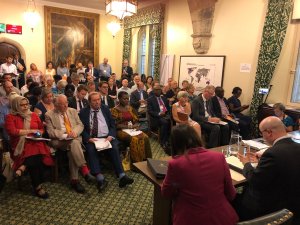Last week I travelled down to Westminster to attend the launch of a new report entitled ‘Visa Problems for African Visitors to the UK’. It is the product of seven months of evidence collection and has been jointly produced by three All-Party Parliamentary Groups (the APPG for Africa, the APPG for Diaspora, Development & Migration and the APPG for Malawi).

The report provides a damning critique of the experience of Africans seeking short-term visit visas to the UK. The headline data is that for a two-year period from September 2016, the refusal rate for African visitors to the UK was 27%, compared with an average across the board of 12% (page 8 of the report). Of course, this does not include data on how many people have been put off even applying in the first place, given a system which the report concludes “does not afford quality decision-making…and is doing tremendous damage to the image and interests of Global Britain” (page 43).
The evidence base for the report also includes a series of personal testimonies from a range of individuals and organisations. During the meeting last week, some audience members in their questions to the Minister for Immigration, Caroline Nokes, recounted their own traumatic experiences with the UK visa system. An online appendix to the report, available here, catalogues these and remains open for further submissions.
The report convincingly argues that the disparities experienced by African applicants are caused by underlying structural barriers. Decisions are perceived to lack fairness, with the evidence collected for the report demonstrating that in some cases applicants are being asked to go beyond the procedural guidelines. Applications are also costly and time-consuming. The UK currently has thirty-two Visa Application Centres (VACs) across the entire continent, which means that the residents of twenty-four African countries have to travel to a neighbouring country to submit their application (page 18). One example, cited in the report, is Mauritania, whose citizens have to apply for a visa to visit Morocco and travel over 4000 km, just to submit a UK visa application (page 20). There is also a lack of accountability in the system with no right of appeal to challenge refusals. Apart from pursuing a judicial review, the only option is to submit a brand new application.
Of course, the findings of this report exist within a wider context that has seen the UK Government employ its ‘hostile environment’ policy in an attempt to appear tough on immigration. More recently, the revelations around the Windrush scandal have highlighted the failings of the Home Office. A recent leak of a draft report of the ongoing investigation into this affair, suggests the “Home Office failed in its legal duty to counter racial discrimination when it implemented its anti-immigration hostile environment programme” (Guardian 27.06.19).
The impact of austerity and outsourcing is also an important backdrop. At the launch meeting, John Vine (former Independent Chief Inspector for Borders & Immigration (ICIBI)) reminded everyone that the Home Office has not been a ring-fenced Department during the years of austerity. He argued that as a result the volume of visa applications was not being matched by sufficient resources. This is despite the fact that applicants for a standard visitor visa to the UK have to pay £95 regardless of whether or not their application is successful (page 19). The report notes that there are now only two Decision Making Centres (DMCs) (in Pretoria and Croydon) for applications from the whole of Africa (page 17). The contract for running these DMCs, along with the VACs, was awarded to a private company (Teleperformance UK Ltd) in 2014. With staff being expected to assess 40-60 applications per day (according to John Vine) it is maybe no surprise that the use of an algorithm has been adopted, which labels applications ‘green’, ‘amber’ or ‘red’. The current ICIBI has raised concerns that as a result “decisions were not being made on the merits of the individual case but on a set of generalised and detached indicators” (page 21).
The report also identifies a number of recommendations. These cover measures to improve both the process of applying for visas and the decision-making procedures. At the launch of the report, John Vine reminded the audience that, during his time as ICIBI, he made very similar suggestions in his annual reports to the Home Office. Another panellist, Dr Robtel Neajai Pailey, suggested that things were so problematic that Africans should consider boycotting the UK visa system to engender effective changes.
In summary, the UK visa system will be a central part of our future relationship with Africa. I have visited both South Africa (on a number of occasions) and Kenya for work and my experience couldn’t be more of a contrast with those who seek to travel in the opposite direction. The APPGs involved in producing this report should be commended for cataloguing the ways in which the current system is failing our partners in Africa and the subsequent damage this is doing to their view of the UK. The full report is available to download here and if you are a UK citizen please do write to your local MP and urge them to read the report and ask questions in parliament on the issues raised.
